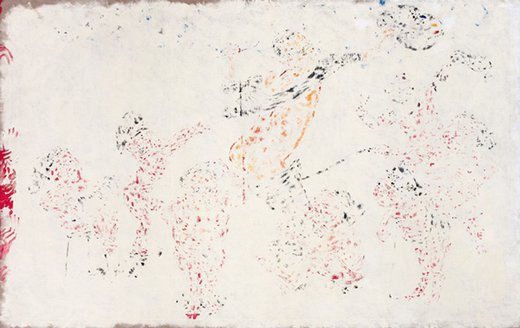Xie Nanxing
dal 10/4/2013 al 5/7/2013
Segnalato da
10/4/2013
Xie Nanxing
Galerie Urs Meile, Luzern
The second whip with a brush. A selection of oil paintings from three of the artist's recent series. Thematically, they toggles between near-abstraction and a string of opaque, psychologically charged narratives.

The most interesting painters today are those who remain compelled to advance the medium’s potential through experimentation and innovation. In this regard, Xie Nanxing (*1970, Chongqing, China; lives and works in Beijing and Chengdu, China) is a maverick. “THE SECOND WHIP WITH A BRUSH”, his solo exhibition at the Lucerne branch of Galerie Urs Meile presents a selection of oil paintings from three of the artist’s recent series. Works from Xie Nanxing’s informally titled Canvas Print series are characterized by their stippled surfaces. Seen over time, their whorls and dots of pigment give way to vivid scenes that are mutually constructed by the artist and the viewer. Paintings from a second series are loosely based on illustrations found in an interior design catalogue, which Xie Nanxing transforms into spaces redolent with references both personal and art historical. The exhibition also features two recent “portraits,” part of an ongoing body of work that pushes a typically conventional genre toward surprising new possibilities. Thematically, “THE SECOND WHIP WITH A BRUSH” toggles between near-abstraction and a string of opaque, psychologically charged narratives, cohering around what the artist calls the “ashes” or “dust” found in every representation.
In the many of the works on view in “THE SECOND WHIP WITH A BRUSH”, there are no clear references to a familiar story. Instead, we are given clues and forced to look hard at what unfolds before us. To generate the exploded pointillism of the Canvas Prints, Xie Nanxing places a panel of rough, woven canvas between his brush and the painting; the daubs of color that comprise the nebulous figures in the finished work are the result of paint passing through the cloth and onto the work’s surface. When the Canvas Prints are viewed with care, forms begin to emerge from the ashes: the figure of the milkmaid can be made out, and Disney’s seven dwarves appear to create some mischief. As in his previous work, the scenarios are freighted with allusions to desire and violence, though in their reduced state they cannot spell out their conditions. Like finely drawn maps of territories long ago renamed, they point to an elsewhere we can only imagine, but can also be admired for their own aesthetic qualities.
As the German cultural critic and architect Siegfried Kracauer (1889–1966) observed, “Spatial images are the dreams of society. Wherever the hieroglyphics of these images are deciphered, one finds the basis of social reality.” [1] For Xie Nanxing, these hieroglyphs are etched in the fashionable rooms appearing in the pages of Dazzling Colorful Home Furnishings, a look book for would-be interior decorators whose images the artist has appropriated and customized for some of the paintings exhibited here. These works are not “about” the tastes of China’s nouveau riche. Instead, Xie Nanxing investigates how even the most innocuous pictures are crawling with symbols and associations, including the cherished fantasies of the artistic avant-garde of the early 20th century. Hence the irony implicit in the title Improvisation 500 (Oblivion) (2011, oil on canvas, 190 x 290 cm) the title of which alludes to the Russian artistic pioneer Wassily Kandinsky’s Improvisations—a large, numbered series created marked by a spontaneity meant to counter the materialism of everyday commodity culture.
Xie Nanxing’s portraits reveal new possibilities for one of painting’s most traditional forms. Rather than creating a carefully rendered likeness of his chosen subjects—a technical exercise Xie Nanxing could perform with ease—the artist offers up something far more interesting: for each work, a particular person is distilled and transfigured into his or her essence. In several earlier paintings, for example, individuals are depicted as Venn-like diagrams, their qualities or thoughts translated into clusters of interlocking circles. In his latest instalment of this evolving series, Xie Nanxing uses the dramatic graphic language of film posters to evoke his subjects. In Portrait No. 2 (2012, oil on canvas, 160 x 120 cm), the text overlaid onto an eerie, forlorn office cubicle can be translated to read “The Young Lady Vanishes,” a knowing reference to the Chinese title of Hitchcock’s 1938 classic thriller The Lady Vanishes.
Those who have seen Xie Nanxing’s earlier works, whether in reproduction or in major international exhibitions such as the 48th Venice Biennale (1999) and Documenta 12 (2007), can easily recall the strange beauty of his exactingly executed canvases, which seldom tell us anything directly but leave us with a great deal to consider. If his recent paintings don’t look like the previous ones, this is because Xie Nanxing refuses to lapse into a signature style. With the new paintings on view in “THE SECOND WHIP WITH A BRUSH” Xie Nanxing not only stirs the ashes of visual culture, but also invites us to stare directly into the flames.
Text: David Spalding
[1] “Über Arbeitsnachweise,” Frankfurter Zeitung 17 June 1930, cited in Karsten Witte, “Introduction to Siegfried Kracauer’s ‘The Mass Ornament,’” New German Critique 5 (Spring 1975), p. 63.
Image: Mug Mat, 2011, oil on canvas 190.5 x 300 cm
Opening: Friday, April 12, 2013; 6 - 8 pm
Galerie Urs Meile Lucerne
Rosenberghöhe 4 6004 Lucerne, Switzerland
Hours
Tuesday to Friday: 10:00 - 18:00
Saturdays: Visitors welcome, please schedule an appointment



